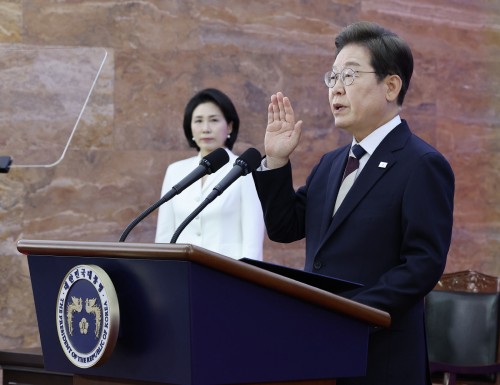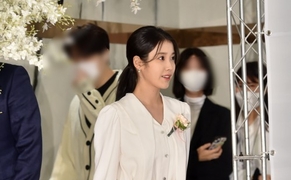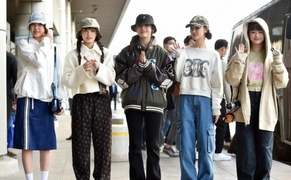 |
| President Lee Jae-myung takes the oath of office during the inauguration ceremony of the 21st president at the National Assembly in Yeouido, Seoul, on June 4. / Source: National Assembly Press Photo Pool |
In his inaugural address on June 4 at the National Assembly, President Lee Jae-myung outlined key priorities for his new administration under the banner of a “pragmatic government.” Speaking under the theme “Message to the People,” Lee pledged to build a “just and inclusive government” and a “flexible, pragmatic government,” laying out a detailed agenda for the years ahead.
His first and top priority is “reviving livelihoods and the economy.” Lee declared, “We will launch an emergency economic task force immediately, with the determination to fight the recession head-on,” and vowed to “use national finances as a catalyst to restore a virtuous economic cycle.”
Emphasizing the importance of “national unity,” Lee said, “Unity is a measure of competence; division is a result of incompetence. Political forces that have neither the ability nor the will to improve people’s lives divide and incite hatred merely to maintain power. I will overcome this crisis through unity and put an end to divisive politics.”
He also revived the “end to insurrection” message he had championed during the campaign, saying, “There must never again be an insurrection in which state power, entrusted by the people, is used to rob them of their sovereignty. We will conduct a thorough investigation to hold those responsible accountable and implement solid measures to prevent recurrence.”
Lee added, “It is time to restore democracy, which was shattered by armored vehicles and automatic rifles. I will answer the people’s solemn demand to plant hope upon these deep wounds and build an entirely new nation.”
On economic policy, Lee advocated for a “pragmatic market-oriented approach.” He stated, “Rather than a government that controls and manages, we will be a government that supports and encourages. The Lee Jae-myung administration will embrace pragmatic market principles.” He also pledged to invest heavily in future industries, saying, “We will become a global industrial leader through large-scale investment and support for advanced technologies such as AI and semiconductors.”
To ease concerns over anti-business sentiment, Lee promised regulatory reform and business support. “We will shift to a negative regulatory framework to ensure creative and proactive business activity,” he said. “We will firmly support entrepreneurs so they can start businesses, grow, and compete freely in global markets.”
Lee further emphasized that “sustainable growth requires a strategic shift. The path to sustainable growth lies in fairly distributing opportunities and rewards. Growth and distribution are not contradictory but complementary, and corporate development can absolutely coexist with respect for labor.”
In foreign policy, Lee committed to “pragmatic diplomacy centered on national interest.” He said, “We will turn the current upheaval in the global economic and security environment into an opportunity to maximize national interest. We will strengthen Korea-U.S. relations and foster Korea-U.S.-Japan cooperation, while engaging with neighboring countries from a pragmatic and national-interest perspective.”
Regarding North Korea, Lee underscored “dialogue” as a key principle. He said, “While maintaining strong deterrence against North Korea’s nuclear and military threats through defense spending twice the size of North Korea’s GDP, a world-class military, and the Korea-U.S. alliance, we will keep communication channels open with the North and pursue peace on the Korean Peninsula through dialogue and cooperation.”
Finally, Lee said, “We will heal the wounds of division and war and chart a future of peace and prosperity. However costly peace may be, it is still better than war. It is better to win without fighting than to win through conflict, and the best security is peace that eliminates the need for war.”
Most Read
-
1
-
2
-
3
-
4
-
5
-
6
-
7





















